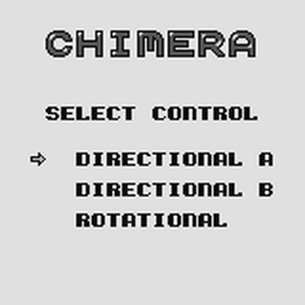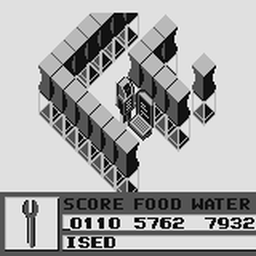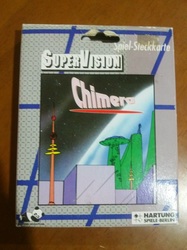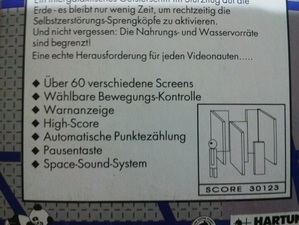REVIEW: Chimera

Game Title: Chimera
Genre: Isometric Adventure
System: Watara Supervision
Developer: B.I.T.S, Ltd
Release date: 1992
Genre: Isometric Adventure
System: Watara Supervision
Developer: B.I.T.S, Ltd
Release date: 1992
Chimera was and remains a genuine anomaly for the Supervision.
Amid a sea of simplistic Sachen developed titles, most of them aping familiar games of better breeding, and simplistic arcade action titles from the handful of other developers that Watara convinced to come aboard it’s doomed handheld, Chimera immediately stands out from the crowd.
It may be a port, but it’s a port with a fine and proven pedigree, beginning its life as a 1985 Sinclair Spectrum game, finding perhaps its best form with a moody, foreboding C64 version and being ported to several other home computers of the time before somehow finding its rebirth on the obscure 1990’s handheld. Quite how this came about is a riddle as head-scratching as some of the game’s more obtuse puzzles. Even its creator, Shahid Ahmad, claims that he can barely remember anything about its development.
Chimera’s sci-fi plot-line centres on a mysterious alien ghost ship, orbiting the Earth and targeting it with its weapons. With the craft declared hostile you play as a lone robot sent onboard to explore and ultimately destroy the ship. Doing so involves navigating the isometric environments of the ship, solving logical problems over its many screens and ultimately assembling and detonating warheads.
Most players, making their first journey into Chimera’s walls, will saunter up to the large radiator in the second room, examine it with the A button and promptly die. A grim scrolling message will inform you that “due to a miscalculation you are now dead” as a lung piercing, digitised scream shatters the silence.
Get ready to see this message often. Chimera is absolutely brutal and creates a palpable sense of tension through the silence of the ship (there is no in game music and minimal sound effects) and the sudden out of the blue deaths as a player examines the wrong thing or uses the wrong item incorrectly resulting in the jump-scare of that ear-bleeding scream. To add to the tension there is an ongoing sense of urgency as counters for food and water supplies tick down at alarming speed (accelerated in rooms with high radioactivity) while the game’s scrolling message window urges you on, giving only the briefest of clues about what to do with the objects you find littered around the ships winding corridors.
Amid a sea of simplistic Sachen developed titles, most of them aping familiar games of better breeding, and simplistic arcade action titles from the handful of other developers that Watara convinced to come aboard it’s doomed handheld, Chimera immediately stands out from the crowd.
It may be a port, but it’s a port with a fine and proven pedigree, beginning its life as a 1985 Sinclair Spectrum game, finding perhaps its best form with a moody, foreboding C64 version and being ported to several other home computers of the time before somehow finding its rebirth on the obscure 1990’s handheld. Quite how this came about is a riddle as head-scratching as some of the game’s more obtuse puzzles. Even its creator, Shahid Ahmad, claims that he can barely remember anything about its development.
Chimera’s sci-fi plot-line centres on a mysterious alien ghost ship, orbiting the Earth and targeting it with its weapons. With the craft declared hostile you play as a lone robot sent onboard to explore and ultimately destroy the ship. Doing so involves navigating the isometric environments of the ship, solving logical problems over its many screens and ultimately assembling and detonating warheads.
Most players, making their first journey into Chimera’s walls, will saunter up to the large radiator in the second room, examine it with the A button and promptly die. A grim scrolling message will inform you that “due to a miscalculation you are now dead” as a lung piercing, digitised scream shatters the silence.
Get ready to see this message often. Chimera is absolutely brutal and creates a palpable sense of tension through the silence of the ship (there is no in game music and minimal sound effects) and the sudden out of the blue deaths as a player examines the wrong thing or uses the wrong item incorrectly resulting in the jump-scare of that ear-bleeding scream. To add to the tension there is an ongoing sense of urgency as counters for food and water supplies tick down at alarming speed (accelerated in rooms with high radioactivity) while the game’s scrolling message window urges you on, giving only the briefest of clues about what to do with the objects you find littered around the ships winding corridors.
|
The robot, carrying a wrench examines a terminal for clues.
|
The German release, with arguably nicer box art and an actual box unlike the American and UK vacuum sealed games.
|
Bizarrely the German release carries only an artist's impression screenshot...and not a very good one at that as the perspective is totally incorrect.
|
The Supervision version of Chimera uses a slightly elevated, more overhead look than the home computer versions did, yet, despite the minimalist nature of the graphics, it also suffers from the infamous ghosting of the Supervision, with the main sprite and the scrolling text blurring as they move. Perhaps more worryingly, unconfirmed reports suggest that the game may be unfinishable due to a missing object near the end of the game. While this would actually fit well with the tradition of several ports of the game (as well as several other Supervision titles) it is disappointing, if true.
The game’s monochrome display also causes problems for puzzles that, in their original incarnations, relied on colour. For example, you are now instructed to “take the warhead to a darker room” instead of a room of specific colour. This can be difficult to interpret on a grey-scale screen and indeed many of the game’s other puzzles may seem difficult to comprehend by modern standards, although, of course, such deliberate obfuscation was common in similar titles of the time.
Despite its flaws, Chimera is an atmospheric, essential addition to any Supervision collection, if only for it being so very different to anything else the system can offer and a genuine curiosity. It remains an interesting and well-intentioned port of a classic game, hampered only by the technology it is lumbered with performing on.
Score: 7/10
The game’s monochrome display also causes problems for puzzles that, in their original incarnations, relied on colour. For example, you are now instructed to “take the warhead to a darker room” instead of a room of specific colour. This can be difficult to interpret on a grey-scale screen and indeed many of the game’s other puzzles may seem difficult to comprehend by modern standards, although, of course, such deliberate obfuscation was common in similar titles of the time.
Despite its flaws, Chimera is an atmospheric, essential addition to any Supervision collection, if only for it being so very different to anything else the system can offer and a genuine curiosity. It remains an interesting and well-intentioned port of a classic game, hampered only by the technology it is lumbered with performing on.
Score: 7/10




